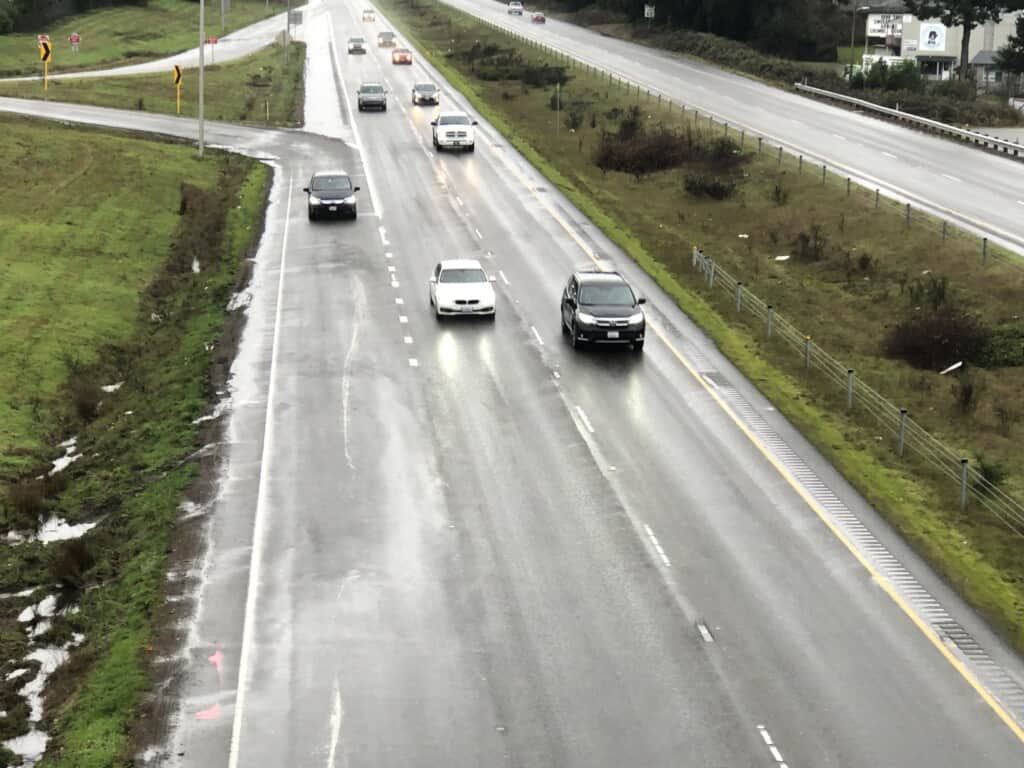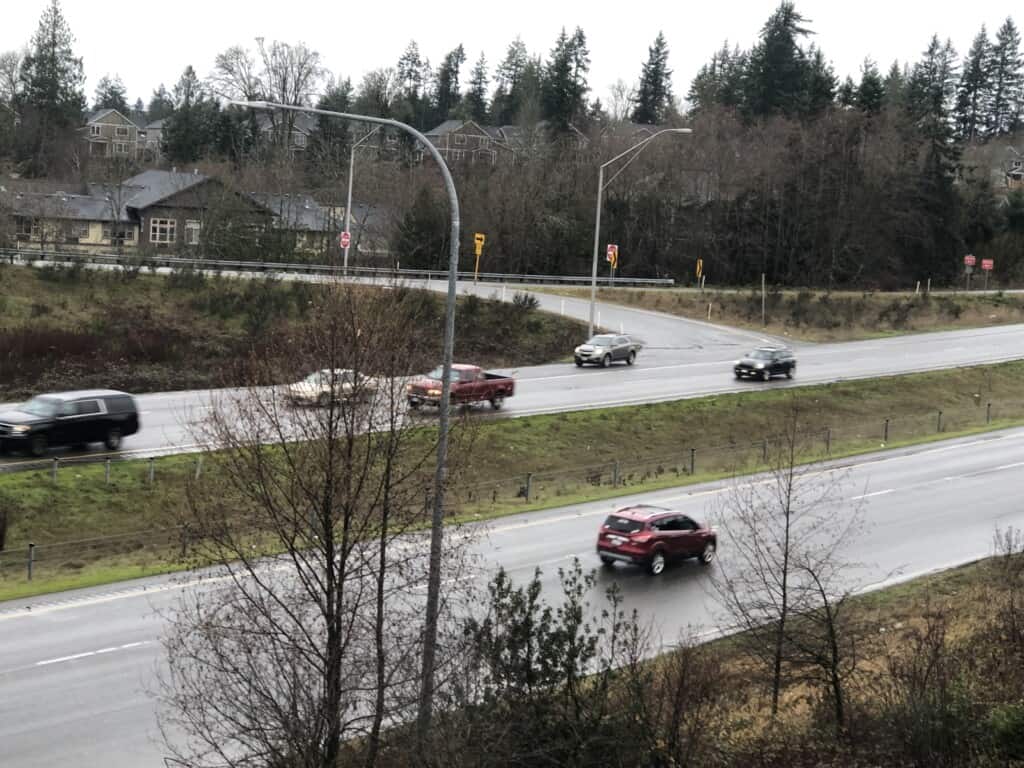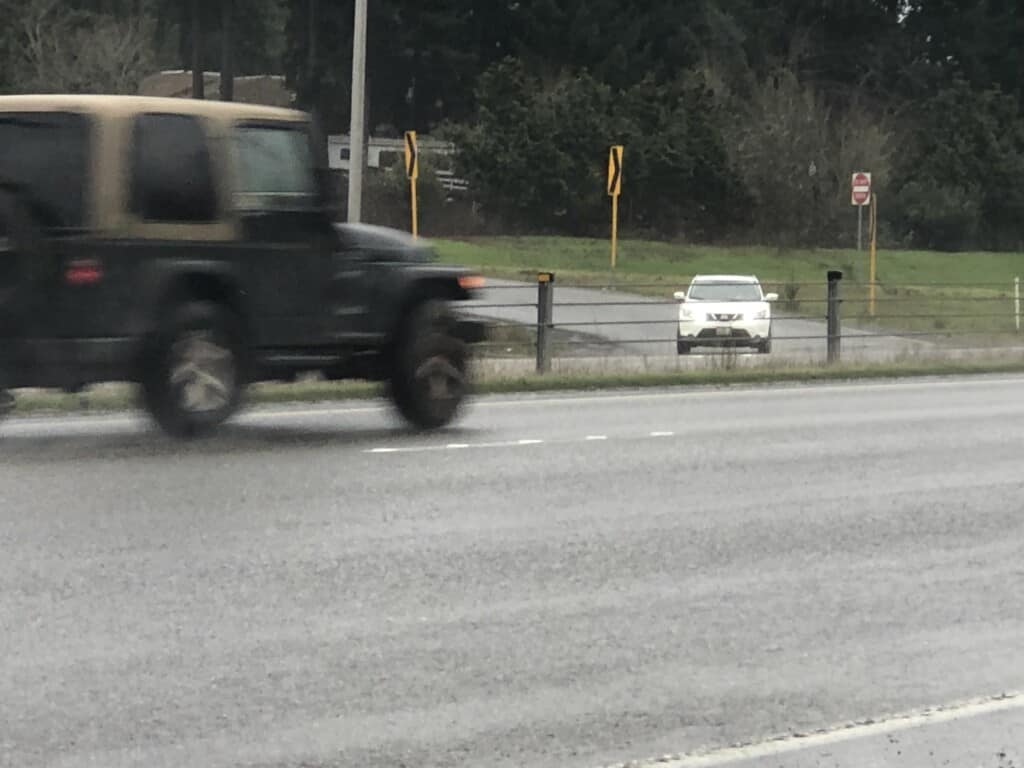Transportation
Crashes continue as Wollochet interchange awaits funding
Rarely does a week go by when there’s not a collision at the Wollochet Drive on-ramps to Highway 16, yet the state has no impending plans to fix them. The Legislature came close to allocating funds in 2019, and will try again in its upcoming session.
During the past 10 years, 287 crashes have occurred at the busy Gig Harbor interchange, according to state Department of Transportation records. November was particularly damaging, with eight accidents, including four days in a row.

Vehicles have a short distance to merge onto Highway 16 from Wollochet’s loop on-ramps. Ed Friedrich / Gig Harbor Now
Fortunately, none of the 287 wrecks resulted in deaths, and only three produced serious injuries. Sixty-eight crashes caused lesser harm to 82 people.
Approaching the highway, vehicles must travel through a loop on-ramp at 10 mph before merging into the mainline. Drivers simultaneously navigate the tight circle while looking for a gap in traffic and trying to get up to speed. The merge lane is short, resulting in many not reaching the 60 mph limit before entering the traffic stream. Slower cars pulling into faster traffic leads to rear-end collisions, which happened in 105 of the 287 crashes. Another 75 accidents involved running into fixed objects, primarily ditches and medians.
Besides hurting people and vehicles, crashes slow or stop traffic on Highway 16, sending drivers looking for alternative routes and clogging up surface streets.
In December 2018, WSDOT completed a $2.4 million Highway 16 congestion study from the Tacoma Narrows Bridge to Gorst. It was described as “a highly technical and robust analysis … to identify the most promising and practical solutions to the congestion and operational issues in the corridor.” A technical advisory group from local jurisdictions and transportation agencies participated. The report provides stakeholders the tools to identify and prioritize needed improvements, the report says.
The study recommended short-term, mid-term and long-term fixes. Short-term (5 years) suggestions for Wollochet Drive include adding turn lanes and modifying signal timing to ease congestion. Extending on-ramp lengths was recommended for the mid-term (10 years). Removing the loop ramps and replacing them with a full diamond interchange was a long-term (20 years) solution.
There is no funding in the 2019-21 transportation budget allocated for any of the strategies in the planning study, said Dennis Engel, multimodal planning manager for WSDOT. Over the next five years, the state will receive $4.7 billion for highways from the federal Infrastructure Investment and Jobs Act, but none is apparently destined for the report’s recommended improvements.

The largest number of crashes are rear-enders, presumably from vehicles not reaching highway speed before merging. Ed Friedrich / Gig Harbor Now
“What I’m hearing is that infrastructure money will be going toward preservation, fish passage and bridge preservation,” Engel said. “We don’t have enough funding to maintain the roads we have, let alone all the fish passages we have to do by 2030 and all the safety work we have programmed, so we’re not out looking or advocating for mobility-type projects. We’re not asking the Legislature for money for mobility because we have too many other priorities we’re trying to fund.”
Steve Hobbs, D-Lake Stevens, the former Senate Transportation Committee chairman, broached a new transportation revenue package the past couple legislative sessions that would’ve helped the Wollochet interchange, but it didn’t advance. Known as Forward Washington, the $18 billion, 16-year proposal would have provided $44 million for Highway 3/16 intersection improvements and $2 million for Gig Harbor congestion improvements. Hobbs is no longer in the Senate, having been appointed in November by Gov. Jay Inslee as secretary of state to replace Kim Wyman, who resigned to become a senior election security lead in the Biden administration.
Gig Harbor is asking for funds from the Legislature in the upcoming session to begin moving forward with congestion measures. The city is requesting $400,000 to add a right-turn lane from Wollochet/Pioneer to the westbound on-ramp to the highway, and for $550,000 for a right-turn slip lane for the eastbound off-ramp to Wollochet. The money would go toward design, engineering and permitting. The total cost, including construction, hasn’t been determined, said Public Works Director Jeff Langhelm.
“We have traffic congestion at both of those intersections, the on-ramp and off-ramp, for that interchange,” he said. “These two projects will mitigate some of the traffic congestion, but definitely not all of it. It’s a fairly low-cost, short-term fix to reduce congestion.”
With the turn lane and slip lane, much more traffic would move through the intersections on a green light, Langhelm said. For both projects, a wall would have to be built or slope filled to widen the road.
Rep. Jesse Young, R-Gig Harbor, who serves on the House Transportation Committee, got $1 million in the 2019-20 budget for Wollochet interchange improvements. More would’ve been added in ensuing biennia until the estimated $18 million project was completed, he said.
“Unfortunately, when the bill moved over to the Senate, in a last-second uncoordinated or uncommunicated change, Sen. (Emily) Randall had the project taken out,” said Young, who is running for Randall’s Senate seat. “She swapped it for pedestrian pathways in Bremerton.” The $1.5 million will fund the design of pedestrian and bicycle safety improvements on the Warren Avenue Bridge.
“We’re going to keep working it. It’s very frustrating, though. It’s been very disappointing that she did that. The hope is that we will finally get it in.”

Recommended improvements include lengthening the on-ramps or building a diamond interchange. Ed Friedrich / Gig Harbor Now
Randall requested that $15 million worth of projects be included in the Senate’s transportation budget, including $1.6 million for Wollochet and $1.5 million for the Warren Avenue Bridge, according to her office. Wollochet never made it into the Senate version. Randall voted for the House version that included $950,000 for Wollochet but no Warren funds in its first passage off the Senate floor on April 4. The House waited until April 26, two days before the end of the session, to refuse Senate amendments, so the bill went to conference committee. The committee, comprising three leaders each from the House and Senate transportation committees (four Democrats and two Republicans), removed Wollochet dollars from what would become the final budget. Only two legislators voted against final passage — Reps. Michelle Caldier, R-Port Orchard, and Vicki Kraft, R-Vancouver.
Spencer Hutchins was a Gig Harbor councilman at the time and said it was the city’s top transportation infrastructure priority.
“I was happy when we were informed that it was included in the approved House version of the transportation budget,” he said, “and I was surprised when it got taken out at the last minute. I think it needs to happen. The city has never changed its tune. It’s always been clear that it was a very clearly identified priority. It was supported by the House Transportation Committee and so I think the need is definitely there from a safety standpoint and a traffic infrastructure standpoint.”
It’s a three-way problem, Hutchins said. It affects the state highway, city infrastructure because so much of city traffic goes through the interchange, and it’s a link to tens of thousands in unincorporated Pierce County.
Tracie Markley, who’ll become Gig Harbor’s mayor in a few days, assumed Hutchins’ council position.
“I remember as a candidate hearing what was going on and that Jesse had put that money into the budget for Wollochet and I was so happy he did that because it had been a huge problem for years,” she said. “We kind of got sideswiped when we didn’t get that money. When I heard that the money went to another project in Bremerton, not even in our (26th) district, that was pretty frustrating.
“There have been accidents there that have snarled up traffic all through town from the bridge through Purdy and it ties it up for hours. There’ not a better way of saying it. It needs to be solved. Gig Harbor should’ve had that money in the 2019 bill. There is no reason that should’ve been taken out and swapped for a project not in our district. It’s a safety issue. It isn’t just about traffic. It’s got to be fixed.”
The Warren Avenue Bridge straddles the 26th and 23rd districts.
Randall, D-Bremerton, said she did receive a funding request from the city for the Wollochet interchange.
“I don’t have notes or know exactly why it didn’t make it into the final budget,” she said. “We don’t get everything we ask for every year and we’ll keep working on this one. I will just say I know it’s important and I’m going to keep working to get that money in.”
Randall said she’s part of a Senate negotiation team that has been working with the House between sessions on what type of new revenue package they can get passed.
“We’ve been in serious talks about what’s the realm of revenue and what are the projects that we spend it on,” said Randall. “Wollochet is certainly part of the discussion. We’re going to try to get as much money as we can for projects in our district in whatever size package that we can.”
